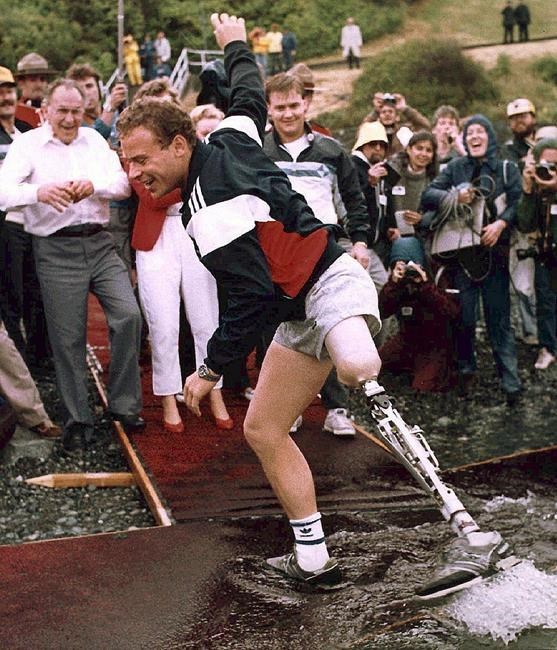Steve Fonyo, who lost his leg to cancer as a child and ran a marathon across Canada to raise millions for cancer research, has died.
He was 56.
Fonyo's niece Melody Kruppa said he had what appeared to be a seizure in a hotel room in Burnaby, B.C., on Friday and paramedics could not revive him.
The cause of death was not clear and the family will have to wait until Tuesday or Wednesday for the coroner to assess the body due to the long weekend, Kruppa said.
"We're in shock," she said.
"We're all just waiting. We're just doing the best that we can. It's just very hard to wait for the coroner to look at him and find out what the cause was and whether we're going to be able to view his body. We just don't know anything right now."
She said Fonyo and his partner had travelled to the Vancouver area from their home in Powell River, B.C., to get the foot on his artificial leg redone.
Fonyo lost a leg to cancer when he was 12 and became a national hero in 1985 after his Canada-wide marathon to raise money for cancer research, five years after Terry Fox attempted the same thing.
Fonyo completed Fox's planned trek, and called it the Journey for Lives. Starting in St. John's, N.L., he travelled 8,000 kilometres on his artifical leg along the Trans Canada Highway, reaching Victoria after 14 months.
He raised more than $13 million and inspired countless people from coast-to-coast, who lined the road to cheer him on along the way.
Fonyo was appointed an officer of the Order of Canada in at the age of 19 — the youngest person to receive the honour at the time.
He was also chosen in an annual Canadian Press survey of editors across the country as Newsmaker of the Year in 1985.
However, his Order of Canada membership was terminated in 2009 following multiple criminal convictions. The decision sparked public outcry, with critics saying at the time he should be remembered as a hero despite his struggles later in life.
In 2015, Fonyo told The Canadian Press that he was putting his life back together after decades of drug abuse, crime and near homelessness.
At the time, the runner was back in the public eye with a documentary called "Hurt" about his troubled life.
The film's director, Alan Zweig, said Fonyo was a complicated person who felt he'd disappointed Canadians and had tried to live a better life.
He said Fonyo attended the movie premiere at the Toronto International Film Festival but had lacked identification to board a plane or train so he made the trip from Vancouver by bus with his girlfriend, Lisa Marie Herbert.
“The film was filled with moments that most of us would be embarrassed by. The crowd saw this fairly warts-and-all movie,” he said.
But when a spotlight at the theatre focused on Fonyo, there was an audible gasp from the audience, Zweig recalled.
“They stood up and gave him a five-minute standing ovation. It was a beautiful moment. They weren’t clapping as much for him as for his struggles,” he said.
Zweig’s second documentary on Fonyo was released in 2017 and titled “Hope.”
“We hoped, and he hoped, and we feel like Canadians hoped that he would someday escape that turmoil and chaos,” Zweig said.
Fonyo seemed to find some joy after moving to Powell River, where he’d entered a rehabilitation program, Zweig said.
“I got to see things get better and more peaceful and more happy for him in the last five years.”
Part of the peace Fonyo felt from living in a smaller community came from reuniting with a former bodyguard from his run, Zweig said.
“That guy loved him and took care of him and helped him, so he had a friend and he had support. It was unquestionable that Powell River healed him to some degree.”
Fonyo said after the release of "Hurt" that Zweig had helped him see things he needed to work on and that his life had become much more stable.
"I need to better myself. And I'm doing that," Fonyo said at the time.
"I don't think they should have taken away my Order of Canada. I think they should have been more supportive, but it's a two-way street. I wasn't really doing anything for myself either."
On the final day of filming for the documentary in February 2015, Fonyo was beaten and stabbed in a devastating home invasion that landed him in hospital for several months.
More than a month after the attack, Fonyo was lifted from an induced coma but he was still suffering from memory loss and slurred speech. His sister, Suzanne Main, told The Canadian Press at the time that doctors had diagnosed Fonyo with a head injury. Main said Fonyo had recovered from a collapsed lung he suffered in the stabbing.
Kruppa, his niece, said Fonyo was her hero.
"He was 11 years older than me. I looked up to him," she said on Monday. "What I respected about him was that he had a lot of difficulties, but he kept going. He just persevered."
Kruppa called on the federal government to reinstate Fonyo's Order of Canada.
"If this isn't possible then I will cut out the photo that I have of his medal and place it on his chest at the burial," she said.
"If the latter is necessary then that would be a real shame."
— With files from Camille Bains in Vancouver
This report by The Canadian Press was first published Feb. 21, 2022.
Maan Alhmidi, The Canadian Press



